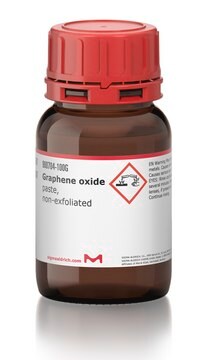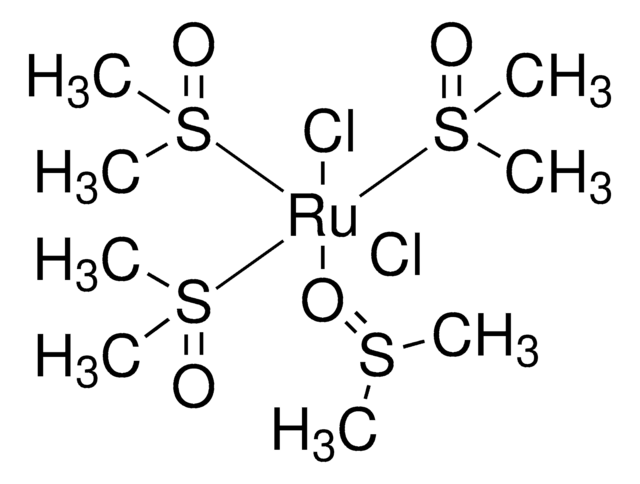84050
Ruthenium(III) chloride hydrate
38.0-42.0% Ru basis
Synonym(s):
Ruthenium trichloride
Sign Into View Organizational & Contract Pricing
All Photos(1)
About This Item
Linear Formula:
RuCl3 · xH2O
CAS Number:
Molecular Weight:
207.43 (anhydrous basis)
EC Number:
MDL number:
UNSPSC Code:
12161600
PubChem Substance ID:
NACRES:
NA.22
Recommended Products
Quality Level
form
powder
reaction suitability
core: ruthenium
reagent type: catalyst
concentration
38.0-42.0% Ru
SMILES string
O.Cl[Ru](Cl)Cl
InChI
1S/3ClH.H2O.Ru/h3*1H;1H2;/q;;;;+3/p-3
InChI key
BIXNGBXQRRXPLM-UHFFFAOYSA-K
Looking for similar products? Visit Product Comparison Guide
Application
- Photocatalytic disinfection: A study highlighted the synthesis of silver-ruthenium bimetallic zinc oxide nanocomposites using Callistemon viminalis leaf extract. These nanocomposites demonstrated effective photocatalytic disinfection properties against Escherichia coli, presenting a promising application in antimicrobial coatings (Jha et al., 2024).
- Photoelectrocatalysis for hydrogen production: RuO(2)/TiO(2) heterostructures were investigated for their potential in photoelectrocatalytic hydrogen evolution, combining experimental and theoretical approaches to highlight the efficiency of ruthenium-based materials in renewable energy technologies (Kaikhosravi et al., 2023).
- Electrochemical applications: The study explored the electrochemical properties of mixed RuOx/MnOx electrodes, prepared by thermal decomposition from different precursors, showing significant implications for their use in energy storage and conversion systems (Petrucci et al., 2022).
- Catalysis and electrocatalysis: Unprotected and interconnected Ru(0) nano-chain networks were examined for their advantages in catalysis and electrocatalysis, illustrating the benefits of unprotected surfaces for improved reaction kinetics and efficiency (Anantharaj et al., 2016).
Other Notes
Catalyst for oxidation reactions with an oxidant; review
Signal Word
Danger
Hazard Statements
Precautionary Statements
Hazard Classifications
Acute Tox. 4 Oral - Aquatic Chronic 2 - Eye Dam. 1 - Skin Corr. 1B
Storage Class Code
8A - Combustible corrosive hazardous materials
WGK
WGK 3
Flash Point(F)
Not applicable
Flash Point(C)
Not applicable
Personal Protective Equipment
dust mask type N95 (US), Eyeshields, Gloves
Choose from one of the most recent versions:
Already Own This Product?
Find documentation for the products that you have recently purchased in the Document Library.
Customers Also Viewed
T. Hasegawa et al.
Chemistry Letters (Jpn), 1385-1385 (1985)
P.H.J. Carlsen et al
The Journal of Organic Chemistry, 46, 3936-3936 (1981)
E.S. Gore
Platinum Metals Rev., 27, 111-111 (1983)
Yao Zhang et al.
European journal of medicinal chemistry, 86, 449-455 (2014-09-10)
Ruthenium-based anticancer complexes have become increasingly popular for study over the last two decades. Although ruthenium complexes are currently being investigated in clinical trials, there are still some difficulties with their delivery and associated side effects. Human serum albumin (HSA)-based
Huaiyi Huang et al.
Dalton transactions (Cambridge, England : 2003), 44(35), 15602-15610 (2015-08-08)
Ruthenium complexes have been considered as promising substitutes for cisplatin in cancer chemotherapy. However, novel ruthenium-based therapies are faced with some limitations, such as unimpressive cytotoxicity toward solid tumors. Herein, we designed and synthesized phenyl-substituted terpyridyl ruthenium(ii) complexes ([Ru(tpy)(bpy)Cl](+) (Ru1)
Our team of scientists has experience in all areas of research including Life Science, Material Science, Chemical Synthesis, Chromatography, Analytical and many others.
Contact Technical Service













